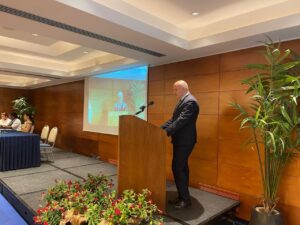Zurab Azarashvili, the Minister of Internally Displaced Persons from the Occupied Territories, Labor, Health and Social Affairs of Georgia, opened a discussion on demographic resilience in Rome.
The meeting was organized by the United Nations Population Fund (UNFPA), Georgia and Bulgaria within the framework of the Ministerial on Demographic Issues.
In his speech, Zurab Azarashvili noted that it is necessary to promote the social inclusion of the elderly further and realize their potential.
According to the Minister, governments have various levers to prepare for demographic change properly and to create societies where the needs of people of all ages will be taken into account.
“I would like to thank the United Nations Population Fund for its many years of support and cooperation. We started discussing demographic trends in Georgia in 2014 when a Guide to Aging Mainstreaming was developed with the support of UNECE and UNFPA. To meet the rights and needs of the elderly, a universal health program is in place to ensure their health, which even funds essential medicines for target groups, including retirees. This reform has helped to increase life expectancy. The government implements various state programs to promote citizens’ employment and job seekers’ professional development. The country has several types of pension systems and targeted social assistance programs. We recognize the need to promote the social inclusion of the elderly further. It is important to harness their potential for the welfare of the country. I would especially like to point out that the rights of the elderly are integrated into Georgia’s updated 10-year national human rights strategy. The document ensures the protection of the rights of the elderly, and supports their integration into the economic and social development of the country. There is also an important emphasis on preventing all forms of violence against the elderly,” Zurab Azarashvili said in a speech.





